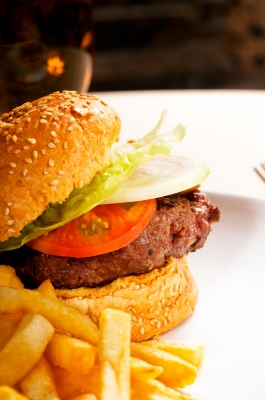What Are Effects of Eating Late?
What Are Effects of Eating Late?

Image courtesy of KEKO64 at FreeDigitalPhotos.net
Many medical experts agree that eating late can cause weight gain. But, there are some of them who claim that it is not eating late that adds more kilos. It is rather a number of calories we take and the questionable quality of food that we eat late at night. Namely, they think that people who eat late at night usually binge. Many of them do not eat because they are hungry. On the contrary, they eat because of boredom, stress, or discontent. For that reason, they do not choose healthy foods for the latest meal. Ice-cream, pizzas, pasta, french fries, and junk food, in general, are their choice. These foods contain a lot of empty calories that significantly overcome daily needs of a body. Binge eating and junk food overload digestive system and cause poor sleep. Late at night, our circadian rhythm prepares our body for sleep and is not ready to digest a huge amount of food. During the evening, the liver is working at its lowest capacity. The liver is also responsible to process sugar, and it is not able to handle larger quantities of this substance late at night. Therefore, it will turn it into fat. On the other hand, poor sleep that is triggered by overloading stomach leads to accumulating more weight. Namely, if we do not have enough sleep, we will feel exhausted and need the extra calories. Because of that, many of us can crave for unhealthy food full of empty calories and sugar. That helps us feel energized fast. To find out more about the effects of eating late, the article “The Dangers of Eating Late at Night” gives us the following information.
What Are Effects of Eating Late?
In the last 35 years, New York physician Jamie Koufman, who specializes in acid reflux, told the New York Times that long work hours necessitate a late dinner for many.1 Then, many people push it back further by trying to fit in shopping, exercise and other activities beforehand.
Adding to the problem, dinner tends to be the largest meal of the day for most Americans, and it’s often made up of heavy processed foods in overly large portions.
Under the best circumstances (in a young, healthy person), your stomach takes a few hours to empty after you eat a meal. As you get older or if you have acid reflux, the process takes longer.
Then, when you lay down to go to sleep, it’s much easier for acid to spill out of your full stomach, which is what leads to acid reflux. Even if you don’t have heartburn, you could still have acid reflux if you have symptoms like hoarseness, chronic throat clearing, and even asthma.
Plus, acid reflux can lead to esophageal cancer, which has risen five-fold since the 1970s. According to Dr. Koufman, “the single most important intervention is to eliminate late eating.”
However, nutritionists warn us that it is not a good idea to skip the latest meal. According to them, it is important to have three basic meals every day with a time span of 4 to 6 hours between them. But, the latest meal should contain healthy nutrients and not so many calories. The total amount of calories should not exceed recommended daily quantities. If we skip this meal, and we are hungry, the effects on weight loss are poor. To achieve the best effects, we can take healthy, balanced meals during a day with an amount of calories that are in accordance with our level of activity.


